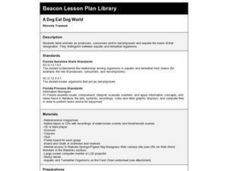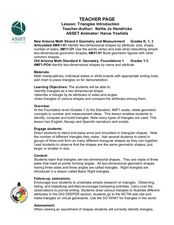Curated OER
A Dog Eat Dog World
Fourth graders distinguish between acquatic and terrestrial organisms. They label animals as producers, consumers, and/or decomposers.
Curated OER
Hop on Pop - Short 'o'
Students practice the alphabetic significance of the letter /o/ along with its awareness of phonemes in spoken words. They assess on construction paper the phrase, "We like to hop on top of Pop who's on top of a hot rock" written on it...
Curated OER
Ask the Oracle
Students invent an imaginary character that has the ability to time travel to China and create stories in the tradition of a traveler's tale, whereas their characters visit China's capital city, Beijing, and go to the Great Wall of China...
Curated OER
Vocabulary Building Worksheet: Short Vowel Sounds
In this vocabulary building - short vowel sounds worksheet, students match words and definition, solve definition clues and complete fill in the blank sentences for 24 short vowel words.
Curated OER
Lesson Two - Compound Words
Students complete activities with the book Sarah Plain and Tall. In this literature lesson, students read chapter two and complete attached activities. They list the compound words they find and study new vocabulary.
Curated OER
Triangles Introduction
Students explore geometry by drawing various shapes in class. In this triangle characteristics lesson, students identify the attributes that classify a shape as a triangle and practice using their bodies to create triangles in class....
Curated OER
Animals That Fly or Do Not Fly
Students classify animals according to if they can or cannot fly.
Curated OER
Things That Fly
Students examine animals that can fly and discover that those animals need wind and wings to be able to leave the ground. They create a chart with two sides and they divide animals and objects that fly.
Curated OER
In My Dream
Students listen to recordings of early jazz and identify examples of ostinato and syncopation. They discuss important personalities from jazz cultures and take a quiz on aspects of jazz.
Curated OER
Dinnertime On The Reef
Students identify the main parts of a coral reef. They describe a coral reef food chain.
Curated OER
Prairies
students make booklets about each of the following: reptiles, birds, plants, animals and buffalo. Each was information and contained the facts covered in class. they research one specific area in which they were especially interested....
Curated OER
Living vs. Non-Living Things
Fourth graders describe the characteristics that determine if something is living, dead, or non-living. They determine the difference between living and non-living things. Students determine if an object is living or non-living and...
Curated OER
Habitat for Sale
Students are able to define habitat, and identify the four things that living things need to survive. They are able to describe how living things are adapted to their habitats.
Curated OER
Mathematics Within: Bar And Pie Graphs
Students compare and contrast the use of bar and pie graphs with the same data. They create a data set by surveying all students in the class using sticky notes to make a table on the board. Then, each student creates a bar and pie graph...
Curated OER
Ecology 8 Land Biomes
Students identify and describe the main features of one land biome. After researching what a biome is, they give various examples of biomes around the world and in their backyards.
Curated OER
Learned Behavior
In this learned behavior worksheet, students review different types of learned behavior including habituation and trial-and-error learning. This worksheet has 7 short answer, 8 matching, and 10 fill in the blank questions.
Curated OER
The Theory of Evolution
In this theory of evolution worksheet, students review vocabulary words associated with evolution including the different types of evolution patters. This worksheet has 5 true or false and 5 matching questions.
Curated OER
Sunshine Math- Earth, XXIV
In this math story problems worksheet, students solve 8 varied problems that include: calculator work, making a list, money, area, and ordered pairs.
Curated OER
Fossils
In this fossil worksheet, students match six terms with their definitions about types of fossils and they circle the proper term to make nine statements true about preservation of fossils.
Curated OER
Line Up Digits to Add
In this addition word problems worksheet, students line up the two digit numbers to add the numbers and solve the six word problems.
Curated OER
Topic Booklets: The Seaside
In this ESL seaside worksheet, learners assemble the booklet and read about things and people they may see at the seaside. Students then respond to 5 fill in the blank questions, 2 short answer questions, and 4 matching questions...
Curated OER
Fossils
In this fossils instructional activity, students review the different types of fossils including index and trace fossils. This instructional activity has 6 matching and 9 true or false questions.
Curated OER
Needs and Wants
Young scholars examine the difference between needs and wants. In this consumption lesson, students illustrate their needs and wants and discuss their own reasons for buying things. They also discuss the connection between their...
Curated OER
The Energy of Life in Zebrafish
Students study the stages of development of an unknown organism. For this zebrafish lesson, students examine and collect data as they use microscopes to view a zebrafish embryo.























